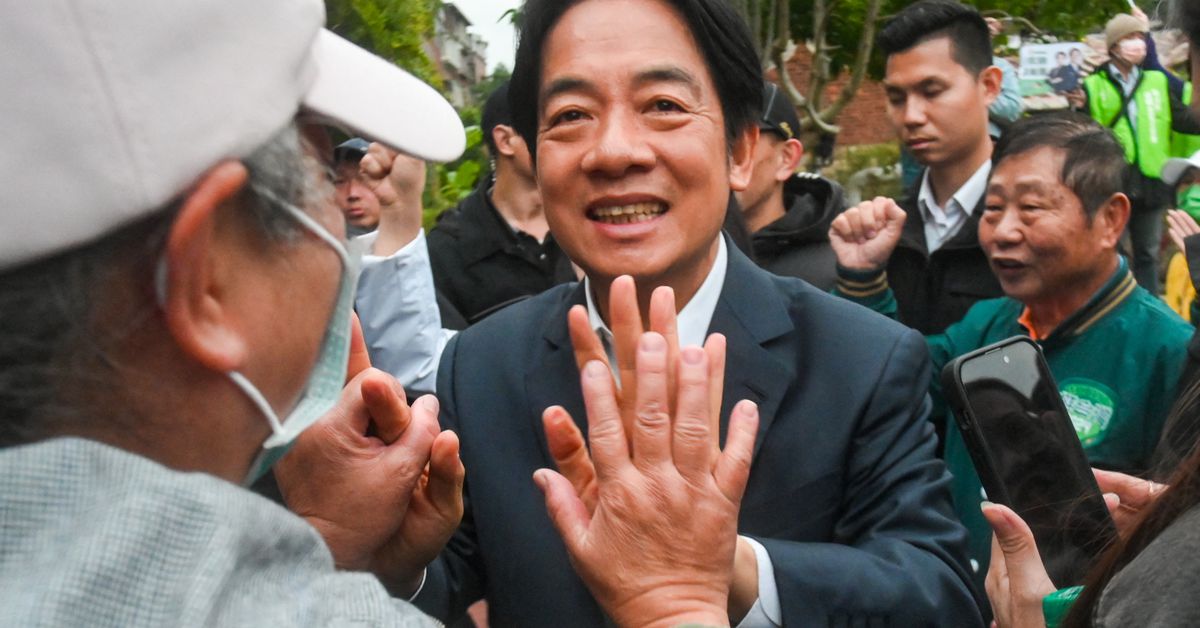Next week’s presidential contest comes down to one issue: China.
Even amid a historically packed global election calendar in 2024, next week’s presidential contest in Taiwan will be one of the most closely watched and significant. The political future of the island and its historically fraught relationship with China — by far the main issue for voters this year — will have consequences not just for Taiwan’s nearly 24 million people, but for global security and prosperity.
China views Taiwan as a rebellious province, rather than an independent country, and Beijing’s longstanding position is that the two should be reunified. Chinese President Xi Jinping recently described this reunification as a “historical inevitability” in his New Year’s address.
While China’s official position has been that this reunification — something Taiwanese voters overwhelmingly oppose — should be accomplished by peaceful means, it has not ruled out using force and has stepped up military and economic pressure on the island. This has alarmed governments and military leaders around the world, given the real possibility that a war over Taiwan could draw in other countries including the United States and devastate the global economy.
Taiwanese and ready to vote for my country. Fuck the a CCP. Taiwan numba 1.
deleted by creator
There is so much fake news and the KMT has been pretty strong with their lies. We will see. We will all be voting on Saturday.
As the article notes; the world at large greatly underestimates the consequences of a move from Xi. I would say the prospect of the Taiwanese blowing up their factories instead of bowing to the will of Bejing is not really that far fetched. But perhaps I’m wrong, and would Taiwan also have many people with the same soft spine that many in the west are showing when it comes down to weaning off our reliance on fossil fuels.
I would say the prospect of the Taiwanese blowing up their factories instead of bowing to the will of Bejing is not really that far fetched.
The very CCP friendly candidate was leading a few weeks ago at 65% of the majority polled, which is why Xi came to the US under such friendly terms for the SF meet.
He fucked up pretty hard and immediately dipped down to 15% though IIRC.
It’s a 3nm process semiconductor factory - just opening a window would put it out of operation!
This is the best summary I could come up with:
The political future of the island and its historically fraught relationship with China — by far the main issue for voters this year — will have consequences not just for Taiwan’s nearly 24 million people, but for global security and prosperity.
Underlining the stakes, a senior Chinese official warned Taiwanese voters this week to make the “correct” choice, describing the election as a decision between “peace and war, prosperity and decline.”
The last time the KMT was in power, from 2008 to 2016, then-President Ma Ying-jeou took a more conciliatory tone and forged a number of trade deals with China, but Beijing was ultimately disappointed by the public backlash this brief detente provoked in Taiwan.
Shen notes that in years past, Xi often played up the possibility of a “one country, two systems” model for Taiwan, referring to the arrangement by which Hong Kong, when it reverted to Beijing’s control in 1997, was promised a degree of political independence while being formally part of China.
Should these highly sophisticated factories suffer major damage or be destroyed in the course of an invasion, “we’d face an economic crisis globally akin to the disruptions that we saw during the Great Depression,” as Chris Miller, author of the book Chip War, said on The Ezra Klein Show last year.
The world’s reliance on these chips is so great that it has sometimes been called Taiwan’s “silicon shield.” The idea is that the global economy, very much including China itself, is simply too reliant on Taiwan-made semiconductors to risk any action that might take the supply offline.
The original article contains 2,103 words, the summary contains 263 words. Saved 87%. I’m a bot and I’m open source!



